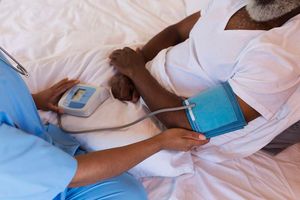Tested positive for Covid-19? Here's how to stay healthy

What you need to know:
- Drink plenty of fluids
- Take vitamins
- Eat healthy, balanced meals
- Get plenty of rest
- Update your doctor on your meds
- Avoid contact with others
- Exercise
- Maintain high levels of hygiene
Covid-19 has disrupted the lives of billions of people around the world.
As the pandemic rages on, more and more people are finding themselves with reduced chances of staying healthy.
However, the following tips can help you stay healthy at home even if you test positive for coronavirus:
1. Drink plenty of fluids
The body loses water through sweating, respiratory tracts, passage of stool and urine. When you get sick, you also lose a lot of fluids especially if you get a fever. You need to replenish your liquid reserves with water and healthy fluids that have electrolytes and minerals. Take fluids even when you are not thirsty. To help increase your fluid intake, keep them within your reach and take regular sips.
2. Take vitamins and mineral supplements daily
When you are sick, vitamins and minerals may be difficult for your body to absorb. Taking a multivitamin ensures you get the nutrients your body needs to fight the disease. Consume multivitamins and supplements such as zinc or Vitamin C that play a major role in fighting the virus by boosting your immunity.
3. Eat healthy, balanced meals
This is the easiest way to maintain your energy and strength. Eating healthy will also boost your immune system so you are better equipped to fight the virus. Consuming healthy foods will also help keep you hydrated and nourished, increasing your lean muscle mass - an important accessory for the immune system. Minimise intake of trans-fats found in foods such as doughnuts and other deep-fried foods and consider replacing sugar with honey for better fluid absorption in the stomach. Foods that are rich in Vitamin C such as green vegetables, peppers, and tomatoes build resilience against infections.
4. Get plenty of rest
It is important to get adequate sleep when you are sick. Your immune system needs the energy from a good night's sleep to repair the body and fight foreign organisms such as viruses or bacteria that could cause an infection. Not getting enough rest can lower your immunity making you more susceptible to infections and delaying recovery. Take a break from work or school when you are feeling too tired.
5. Update your doctor on your medications
Make sure your doctor knows about all the medicines you are taking, including over-the-counter drugs and supplements. Coronavirus causes flu-like symptoms and so far, has no cure. However, there are supplements or medication that help ease some of the symptoms. Home remedies have been proven effective in fighting the virus but is advisable to consult your doctor before-hand to avoid possible allergies or other complications. There are many misleading remedies online. Find out from your doctor what is effective and safe for you.
6. Exercise
Keep your body active with exercises such as cycling, swimming, and aerobics. Working out increases metabolism and helps boost your immune system. If you are extremely sick, do your best to complete simple exercises for at least 10 minutes. You can do simple workouts like yoga and stretches at home since they are effective too. But avoid pushing yourself.
7. Avoid contact with others
Stay home if you can and be cautious if you are living with other people. Protect them from being exposed to the virus. It is also important to avoid crowds of any kind including those in church or schools. If it is not possible, then take safety precautions.
8. Maintain high levels of hygiene
The virus spreads through droplets - from a person who sneezes or coughs - and contact with contaminated surfaces. Sanitise surfaces to avoid droplets from spreading. Ensure you wash your fruits and vegetables before eating. Disinfect your utensils after using them to protect those who are virus-free. Avoid sharing foods and drinks with others to prevent the virus from spreading.



